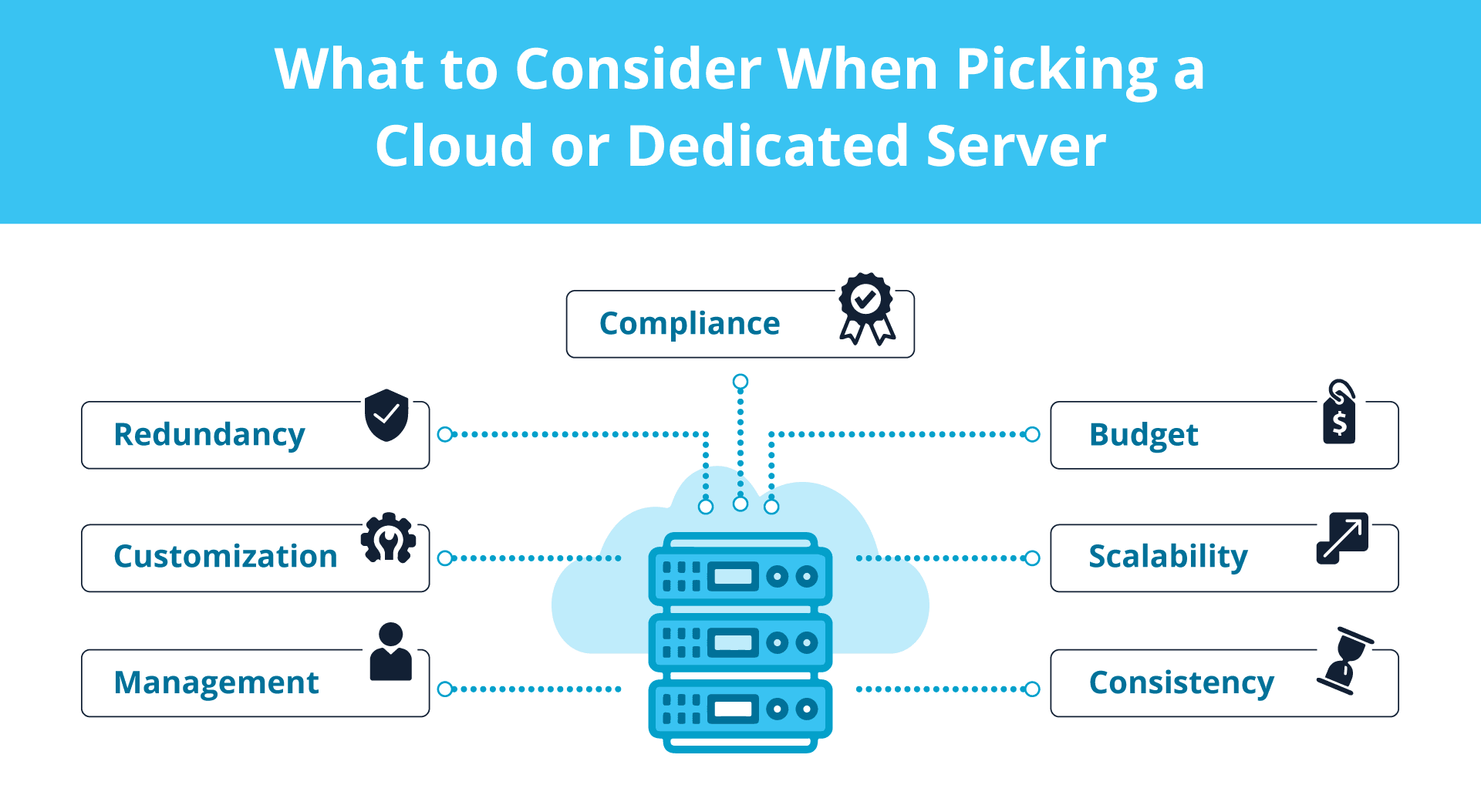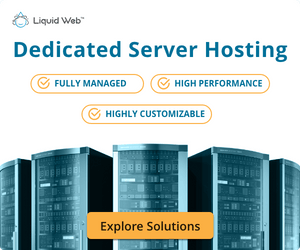Cloud servers vs. dedicated servers: Which is better for business?
Both cloud and dedicated servers have sufficient resources to support businesses of varying sizes. The private cloud market share was valued at $92.64 billion in 2023 and is expected to hit $405.3 billion by 2033.
Meanwhile, the dedicated server market share was $14.26 billion in 2022 and is expected to reach $47.9 billion by 2029.
As these two hosting options continue to boom, many enterprises rely on them to host their websites, apps, and databases. But which is best for your business?
This guide provides a side-by-side comparison of cloud servers vs. dedicated servers and explores their use cases, helping you choose the best hosting solution for your business.
Key points
- Private cloud and dedicated servers are viable hosting solutions for enterprise businesses.
- Cloud servers are virtual servers distributed across several physical machines, while dedicated servers are physical machines leased to single tenants.
- While cloud servers use pay-as-you-go pricing, dedicated servers have a fixed monthly price, making them more expensive.
- Although dedicated and cloud servers are reliable hosting solutions, performance depends on your chosen provider.
- Your choice between dedicated servers vs. cloud servers largely depends on your hosting needs and budget.
Here’s what we’ll cover:
What is a cloud server?

Cloud servers are virtual machines operating on a network of physical hardware and virtual servers. This means that one virtual machine that runs your website’s server is spread across multiple physical machines.
Thanks to virtualization technology, cloud servers are incredibly scalable — you can easily adjust server resources as your website evolves, ensuring operational efficiency. Also, cloud servers do not depend on a single physical server. So, their resources can easily adjust to meet the fluctuating needs of the applications and sites running on them.
When considering whether or not to choose a cloud server, it’s important to understand its two primary hosting types — public and private cloud hosting.
Similar to virtual private server (VPS) hosting, public cloud hosting involves sharing computing resources with other users on the same server, but this can pose security threats due to its shared nature.
By contrast, private cloud hosting offers fully isolated environments, giving you a similar level of privacy to dedicated servers.
How cloud servers work
Cloud servers leverage the resources of several physical servers in a data center. Using a hypervisor, a cloud service provider creates and manages several virtual machines on a single physical server.
When a user requests server resources like computing power, storage, or bandwidth, the cloud provider allocates these from the pool of available resources in the virtualized environment.
This process is executed by advanced algorithms that optimize resource utilization using load balancing techniques to distribute workloads across multiple servers. And because no single server is overworked, you can expect high performance from this hosting setup.
What is a dedicated server?

Because your server is isolated from other users, you won’t have to deal with outages or performance issues caused by other users’ resource usage.
A dedicated server offers full root access, which means you can tailor the server environment to suit your specific requirements. With complete control over your server’s hardware, operating system, and software configuration, you can optimize its performance and security, ensuring your website or app runs smoothly.
How dedicated servers work
A dedicated server functions like a computer running an operating system (e.g., Linux or Windows) and allowing you to install software. The difference is that dedicated servers run networking server software, which enables them to host content on the Internet.
The major difference between this and cloud hosting is that dedicated servers are single, physical servers. You can upgrade a dedicated server or purchase more, but a cloud environment is more of a collection of scalable resources.
Managed dedicated servers come with additional support services, like setup and general maintenance. Unmanaged servers make installing, updating, and maintaining software your business responsibility.
Dedicated servers vs. cloud servers: Key differences
Both cloud servers and dedicated servers offer high-end computing resources suitable for enterprises. However, their differences can significantly impact your hosting experience.
Let’s compare the differences between dedicated vs. cloud servers to help you decide the ideal option for your business.
Pricing
Pricing is one of the most significant differences between cloud and dedicated servers.
With a cloud server’s pay-as-you-go pricing model, you only pay for the server resources you use. This means you can easily purchase more resources as needed or scale down if your requirements decrease.
Dedicated servers typically have a fixed monthly price. No matter how many resources you use, the price stays the same. While its predictable pricing model simplifies financial planning, you may end up paying for underutilized resources.
Scalability
When the ability to seamlessly adjust resources is a priority, cloud servers are the way to go.
Cloud infrastructure, like Liquid Web’s Cloud VPS or private cloud servers, is fully scalable, thanks to virtualization and dynamic resource allocation that ensure these systems adjust to real-time demands. This means you can quickly upgrade cloud servers to meet the changing needs of your business.
Dedicated servers are built differently. They are physical machines, so if you wish to upgrade them, you’ll need to purchase more powerful components and wait for the web hosting company to perform the upgrade for you.
Cloud-dedicated servers exist to address some of these limitations. They combine the high performance of a traditional dedicated server with the scalability of the cloud infrastructure, making them a superior choice for businesses with dynamic resource requirements.
Deployment
Because the cloud is a virtualized environment that mainly involves spinning up new instances from preconfigured templates, cloud servers are deployed in seconds or minutes.
Cloud providers share hardware resources among virtual servers, so new deployments can be created immediately with no additional hardware requirements. Add the automation tools layer that can configure resource allocation and network settings without human intervention, and cloud servers offer almost instant resource deployment.
On the other hand, provisioning a dedicated server takes longer because it depends on physical allocation and deployment. Also, because a dedicated server requires network configuration, physical installation, and server installation, deployment may take anywhere from a few minutes to several hours.
Speed
Dedicated and cloud servers both boast powerful infrastructures, so their speeds could be about equal. Because you’re not sharing computing resources, dedicated servers offer more consistent performance, while cloud servers offer more consistent uptime due to their high availability.
Which is faster will depend on your hosting provider and how they set up their cloud and traditional server stacks.
Liquid Web’s Service Level Agreement (SLA) guarantees fast response times, 100% uptime, and a 30-minute hardware replacement, ensuring your server is always available. So, whichever option you choose, you’ll get a bang for your buck.
Customization and control
Dedicated servers offer a high level of control and customization. This hosting environment allows you to fully customize your software configuration and install just what you need. Furthermore, when you opt for unmanaged dedicated hosting, like that offered by Liquid Web, you get to set up everything yourself.
By contrast, cloud servers give you some control over your system. It’s important to note, though, that public cloud solutions may not offer full root access. This means you can’t completely customize the server to suit your specific requirements.
If you need help setting up your tech stack, consider managed cloud services. Liquid Web’s VMware private cloud hosting gives you an isolated server environment with predictable performance, ensuring high uptime for business-critical workflows.
Reliability and redundancy
Cloud servers rule this category due to their high-availability infrastructure. With thousands of servers to fall back on at any moment, downtime is rare.
This makes cloud servers best for reacting to traffic surges and scaling during holidays and other events. If you get a massive influx of traffic, your server will automatically spin up more resources as needed.
Although dedicated servers are highly customizable, replicating the redundancies of the cloud environment would be an expensive venture due to the cost of multiple physical servers and the human resources required for deployment and maintenance.
Cloud vs. dedicated server: Choosing the best option

After comparing the key differences between dedicated vs. cloud servers, it’s time to decide which is best for your business. Providing answers to these crucial questions can help you assess the viability of cloud or dedicated servers for your project:
What are your budget constraints?
Considering the high costs of a dedicated server, it’s an ideal hosting infrastructure for large-scale businesses with a high budget.
On the other hand, cloud servers use a pay-as-you-go pricing model, making them suitable for small businesses with a limited budget. However, some cloud hosting providers may charge additional fees for specific features or services.
To make the best choice, evaluate any upfront and maintenance costs for both dedicated and cloud servers.
How quickly do you need to scale resources?
However, if your project is likely to grow quickly or require varying amounts of server resources, cloud hosting solutions are a better choice. With cloud hosting, you can easily scale resources up or down as your needs change.
Does your site or app require consistent performance?
Because you don’t share computing resources with other users, a dedicated server offers consistent performance, making it the ultimate choice for applications that require high computing power or intensive workloads.
With a cloud server, you may experience some performance fluctuations due to its shared nature, so it may not be suitable if your business requires consistent performance.
How important is redundancy for your project?
While redundant infrastructure is suitable for projects of any size, the fail-safe measures and load balancing capabilities provided by cloud servers significantly reduce downtime. This configuration is perfect for mission-critical sites and applications where even the smallest amount of latency is intolerable.
With dedicated servers, such redundancy is typically expensive and time-consuming. Still, you may want to opt for this setup if your business requires high levels of data security or has a predictable demand for computing resources.
Do you require full control over your server?
Should your project require high levels of customization and control, dedicated servers are the ideal option. Dedicated servers allow you to adjust settings, server hardware, and software as needed. However, this level of control requires technical expertise and is potentially time-consuming.
On the other hand, if you prioritize scalability over control, cloud servers may better suit your needs.
Can your team handle server management tasks?
Consider your team’s capacity for server management. If your team has the technical expertise and resources required to perform management tasks, dedicated servers are a superior choice.
Cloud services typically don’t require as much hands-on management, making them suitable for teams without specialized IT resources.
Are there any industry-specific regulations you must adhere to?
When choosing between cloud servers vs. dedicated servers, it’s important to consider industry-specific regulations that dictate how to handle sensitive data.
For instance, if you’re handling customer payment details or sensitive medical information, you must choose a server that complies with regulations like the Health Insurance Portability and Accountability Act (HIPAA).
Thanks to its isolation, a dedicated server offers more privacy than a public cloud server and may be required for compliance in some highly regulated industries.
While considering these factors, it’s important to note that the decision between cloud vs. dedicated servers largely depends on your business needs. To make the right choice, you must define your needs upfront and carefully assess your options.
Final thoughts: Cloud vs. dedicated servers for enterprises
Finding the right hosting environment can be challenging, especially since cloud and dedicated servers are both valid choices for enterprises.
Cloud hosting is the perfect choice if you need a quickly deployable and highly scalable solution. But if you’re hosting a website or app that requires specific configurations, dedicated servers are a better option.
Also, consider the pricing differences, as dedicated servers typically have fixed monthly plans while cloud servers use resource-based pricing models, making them more affordable since you only pay for the resources you use.
Whichever server you opt for, choose a reputable company that provides a secure hosting environment. Liquid Web offers high-availability dedicated server hosting alongside plenty of cloud hosting options, including VMware Private Cloud.
Each plan comes with a secure firewall, real-time DDoS protection, and Acronis Cyber Backups, ensuring your data remains safe and accessible. Need help choosing the right plan? Contact us today.
Related Resources
Trending

Jake Fellows
Jake Fellows is the Sophisticated Hosting Product Manager for Liquid Web's Managed Hosting products and services. He has over 10 years experience involving several fields of the technology industry, including hosting, healthcare, and IT-system architecture. On his time off, he can be found in front of some form of screen enjoying movies, video games, or researching into one of his many technical side projects.
Keep up to date with the latest Hosting news.



